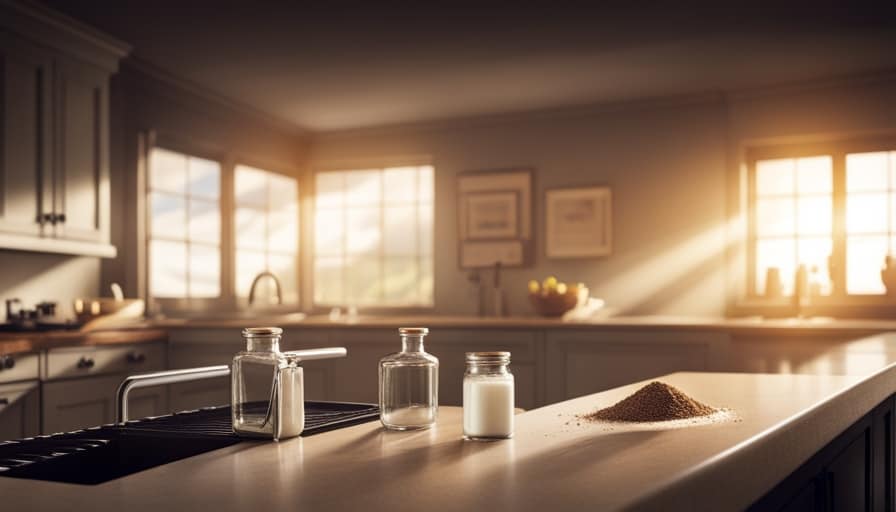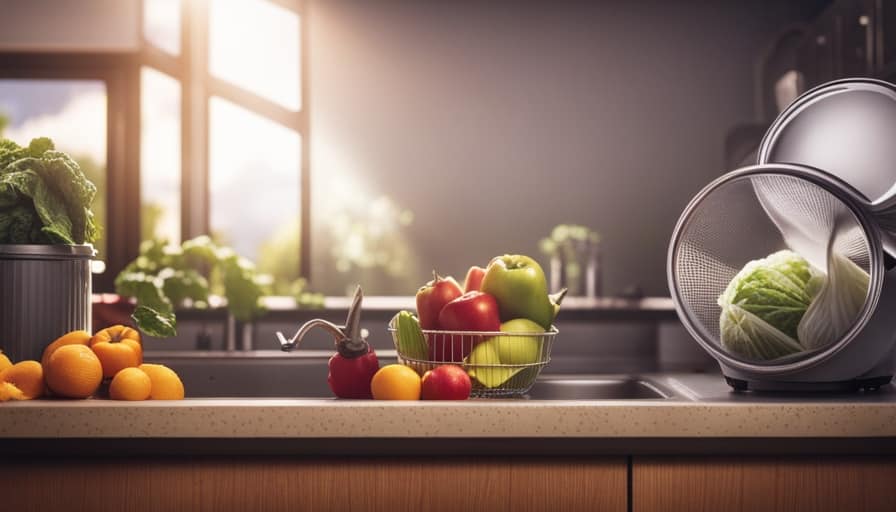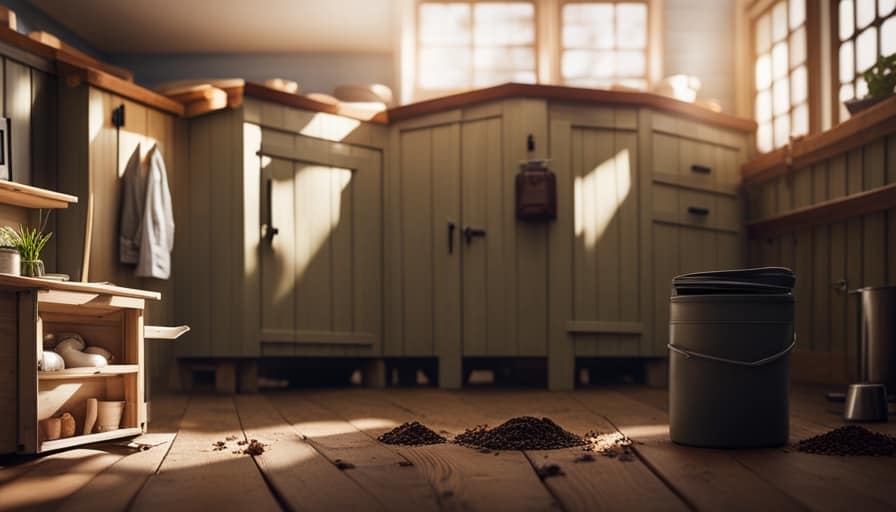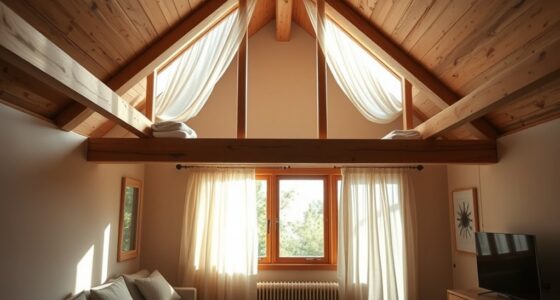You may be asking yourself, “How exactly do toilets in tiny houses operate?” Allow me to explain it to you.
Tiny house toilets are designed to maximize space while still providing all the necessary functionality. From composting toilets to waterless solutions, there are various options available to suit your needs.
In this article, I will delve into the different types of tiny house toilets, their innovative designs, and the maintenance required. So, let’s explore the world of tiny house toilets together!
Key Takeaways
- Tiny house toilets come in various types, including composting toilets, portable toilets, incinerating toilets, chemical toilets, and dry flush toilets.
- Composting toilets in tiny homes use natural processes to break down waste into compost, saving water consumption and eliminating the need for plumbing.
- Innovative designs for limited spaces include wall-hung toilets, concealed tanks, and compact composting toilet systems.
- Maintenance and care for tiny house toilets involve regular cleaning, proper composting guidelines for composting toilets, checking ventilation systems, considering portable options, and following manufacturer’s instructions.
Types of Tiny House Toilets
What are the different types of tiny house toilets that I can choose from?

When it comes to tiny house living, choosing the right toilet is essential. Two popular options for tiny house toilets are composting toilets and portable toilets.
Composting toilets are an eco-friendly choice that turns waste into compost. They use little to no water and rely on natural processes to break down waste into a safe and odorless compost material. These toilets are ideal for off-grid living and require minimal maintenance.
On the other hand, portable toilets provide convenience and flexibility for tiny house owners. They’re compact, lightweight, and easy to move around. Portable toilets typically use chemical treatments to control odors and break down waste. They’re a great option for those who frequently travel or move their tiny homes.
Both composting toilets and portable toilets offer unique benefits for tiny house living. Consider your specific needs and preferences to choose the toilet that suits you best.

Waterless Solutions for Tiny Homes
I really appreciate the convenience and sustainability of waterless solutions for my tiny home. When it comes to alternative options for toilets, composting toilets are a great choice. Here are some key features of waterless solutions:
-
Composting toilets: These toilets use a natural process to break down waste into compost. They typically have separate chambers for urine and solid waste, and use organic materials like sawdust or coconut coir to aid in the decomposition process.
-
No water usage: One of the biggest advantages of waterless solutions is that they don’t require any water. This not only saves on water usage, but also eliminates the need for plumbing and sewage systems.
-
Odor control: Waterless toilets are designed to minimize odors by using ventilation systems and carbon filters. This ensures a fresh and odor-free environment.

-
Nutrient-rich compost: The waste produced by composting toilets can be used as fertilizer for plants, making them an environmentally friendly option.
With these waterless solutions, I can effectively manage waste in my tiny home while minimizing my ecological footprint.
Now let’s explore some innovative designs for limited spaces.
Innovative Designs for Limited Spaces
While researching tiny house toilets, I discovered some innovative designs that maximize space efficiency. Space-saving toilet designs are crucial when it comes to limited spaces in tiny houses.

One such design is the wall-hung toilet, which is mounted directly onto the wall, saving valuable floor space. These toilets have a sleek and modern appearance, and their tanks are concealed within the wall, further maximizing space.
Another innovative option is the composting toilet, which isn’t only space-saving but also eco-friendly. These toilets use natural processes to break down waste into compost, eliminating the need for water and plumbing. They’re a great alternative for those looking to minimize their environmental impact.
Maintenance and Care for Tiny House Toilets
To ensure the proper functioning of my tiny house toilet, I follow a few simple maintenance and care steps. Here’s what I do:
-
Regularly clean the toilet bowl and seat with a mild cleaner to prevent any buildup or odors.

-
Empty the composting toilet container as needed, making sure to follow proper guidelines for composting waste.
-
Check the ventilation system regularly to ensure that it’s working effectively in reducing any potential odors.
-
Consider portable toilet options for added convenience, especially if you plan on traveling frequently with your tiny house.
Pros and Cons of Tiny House Toilet Options
One option for a tiny house toilet is a composting toilet, which offers certain benefits but also has some drawbacks. Composting toilets are a sustainable and eco-friendly option as they do not require water and produce compost that can be used as fertilizer. They are also portable, making them suitable for mobile tiny homes. However, there are some considerations to keep in mind. Composting toilets require regular maintenance and proper management of waste to prevent odors and ensure proper decomposition. They may also require additional space for the composting process. On the other hand, portable toilets are another option for tiny houses. These toilets are easy to install and maintain, with the added advantage of being compact and lightweight. However, they do require regular emptying and disposal of waste.

| Composting Toilets | Portable Toilets |
|---|---|
| Sustainable and eco-friendly | Compact and lightweight |
| No water required | Easy to install and maintain |
| Produces compost as fertilizer | Regular emptying and waste disposal required |
| Regular maintenance and proper waste management needed | – |
Frequently Asked Questions
Is It Possible to Connect a Tiny House Toilet to a Traditional Septic System?
Yes, it is possible to connect a tiny house toilet to a traditional septic system. By properly plumbing the toilet to the septic system, waste can be safely and efficiently disposed of.
Can I Use Regular Toilet Paper With a Composting Toilet in a Tiny House?
Yes, you can use regular toilet paper with a composting toilet in a tiny house. However, there are alternative toilet paper options that are more compatible with composting and offer the benefits of quick decomposition and minimal environmental impact.
Are There Any Regulations or Permits Required for Installing a Tiny House Toilet?
Yes, there are regulations and permits required for installing a tiny house toilet. These regulations ensure that the installation meets safety and sanitation standards, and permits are necessary to ensure compliance with local building codes.
How Often Do I Need to Empty the Waste Container in a Portable Tiny House Toilet?
Emptying the waste container in a portable tiny house toilet depends on usage, but generally it needs to be emptied every 1-2 weeks. It’s important to follow proper disposal guidelines to maintain cleanliness and prevent odors.

Can I Use a Regular Flushing Toilet in a Tiny House?
Yes, you can use a regular flushing toilet in a tiny house. However, alternative options like composting toilets have benefits such as reducing water usage and providing nutrient-rich compost for gardening.
Conclusion
In conclusion, tiny house toilets offer a range of options for those looking to maximize space and minimize waste. From waterless solutions to innovative designs, these toilets provide efficient and sustainable alternatives for small living.
While maintenance and care may require extra attention, the pros of these toilets outweigh the cons. So whether you’re considering a composting toilet or a compact flush system, tiny house toilets are a smart and practical choice for minimalist living.









